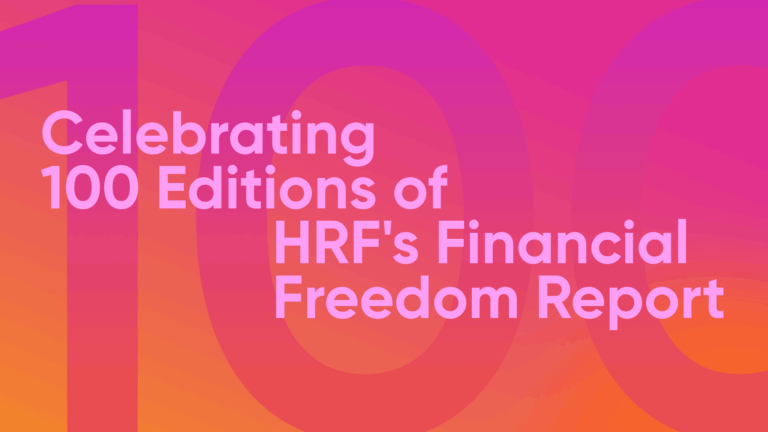Good morning, readers!
In Georgia, mere weeks after freezing the bank accounts of five NGOs supporting pro-democracy movements, the ruling Georgian Dream party passed a new law banning foreign organizations from providing grants to local groups without regime approval. The bill is part of a broader effort to silence dissent and weaken democracy through financial repression.
In Latin America, opposition leader María Corina Machado seeks to rally citizens against Nicolás Maduro’s immensely repressive regime. With the economy and currency in shambles and dozens of military personnel abandoning Maduro, Machado sees an opportunity to challenge his grip on power.
In open source news, we spotlight the release of Bitcoin Core version 29.0, the latest update to the primary software that powers the Bitcoin network and helps millions of people send, receive, and verify Bitcoin transactions every day. This release improves the reliability and compatibility of Bitcoin’s main software implementation. We also cover the unique story of LuckyMiner, an unauthorized Bitaxe clone making waves in Asian markets as demand soars for small, low-cost, home mining equipment — evidence that people want to participate in the Bitcoin network themselves.
We close with the latest edition of the HRF x Pubkey Freedom Tech Series, in which Nicaraguan human rights defender Berta Valle joins HRF’s Arsh Molu to explore how authoritarian regimes weaponize financial systems to silence dissent and isolate opposition voices and how tools like Bitcoin can offer a way out. We also feature an interview with Salvadoran opposition leader Claudia Ortiz, who discusses the erosion of civil liberties under President Nayib Bukele and offers a nuanced take on Bitcoin in the country.
Now, let’s jump right in!

Global News
Georgia | Bans Foreign Donations for Nonprofits and NGOs
Mere weeks after freezing the bank accounts of five NGOs supporting pro-democracy demonstrators in recent unrest caused by elections, Georgia’s regime passed a new law that bans foreign organizations from providing “monetary or in-kind grants” to Georgian organizations and individuals without regime approval. Introduced by the increasingly repressive Georgian Dream party, the bill is part of a broader effort (including the controversial foreign agents law passed in 2024) designed to silence dissent and dismantle pro-democracy groups. Rights groups warn these laws will cripple civil society by cutting funding and imposing heavy fines for violators. Last week, parliament also read a bill that would grant officials the power to ban opposition parties entirely. With civil society financially repressed, Georgia is sliding further into tyranny, where free expression, political opposition, and grassroots organizations are under siege.
Venezuela | Opposition Mobilizes Against Maduro’s Financial Repression
Venezuelan opposition leader María Corina Machado is intensifying efforts against Nicolás Maduro’s brutal regime by targeting what she believes are his two greatest vulnerabilities: a collapsing economy and fractures in his repressive apparatus. As the Venezuelan bolivar unravels (reaching a record low in March) and inflation spirals out of control (expected to reach 220% before the end of the year), Maduro’s regime doubles down. It imposes currency controls, expropriates private property, and exerts complete state control over banks. Meanwhile, signs of discontent are growing inside the military, with dozens of personnel reportedly deserting. “I think we have a huge opportunity in front of us, and I see that much closer today than I did a month ago,” Machado said. To rebuild Venezuela’s future, Machado sees financial freedom as essential and has publicly embraced Bitcoin as a tool to resist the regime’s weaponization of money.
India | UPI Outage Disrupts Payments Nationwide
Digital transactions across India were disrupted mid-April as the Unified Payments Interface (UPI) experienced its third major outage in the last month. UPI is a government-run system that enables digital payments and underpins India’s push towards a cashless, centralized economy. Fintechs, banks, and institutions plug into UPI as a backbone of their digital infrastructure. Recently, India started integrating its central bank digital currency (CBDC), the digital rupee, into UPI, leveraging its existing network effect to expand the reach of state-issued digital money. When a single outage can freeze an entire nation’s ability to transact, it reveals the fragility of centralized infrastructure. By contrast, decentralized money like Bitcoin operates independently of state-run systems and with consistent uptime, giving users the freedom to transact and save permissionlessly.
China | Bitcoin for Me, Not for Thee
China is debating new regulations for handling its growing trove of Bitcoin and other digital assets seized during criminal investigations. While the regime debates how to manage its seized digital assets, the trading of Bitcoin and other digital assets remains banned for Chinese citizens on the mainland. Reports indicate that local governments have quietly sold confiscated Bitcoin and other digital assets through private companies to bolster their dwindling budgets. If true, this exposes the hypocrisy of a regime banning digital assets for its people while exploiting them as a strategic revenue source for the state. This contradiction accentuates the ways authoritarian regimes manipulate financial rules for their own benefit while punishing the public for using the same strategies.
Serbia | Vučić Targets Civil Society as Economy Sinks
As Serbia’s economy stalls and the cost of living remains stubbornly high, President Aleksandar Vučić is escalating his crackdown on civil society to deflect blame and tighten control. After a train station canopy collapse in Novi Sad killed 16 people last November, protests erupted. Serbians, led by students, flooded the streets to protest government corruption, declining civil liberties, and a worsening economy. The protests have since spread across 400 cities, reflecting nationwide discontent. In response, Vučić is now targeting civil society organizations under the pretext of financial misconduct. Law enforcement raided four NGOs that support Serbians’ human rights, the rule of law, and democratic elections.
Russia | Jails Four Journalists for Working With Navalny
A Russian court sentenced four independent Russian journalists to five and a half years in prison for working with the Anti-Corruption Foundation (ACF) — a pro-democracy organization founded by the late opposition leader Alexei Navalny. The journalists — Antonina Favorskaya, Konstantin Gabov, Sergei Karelin, and Artyom Kriger — were convicted in a closed-door trial for associating with an organization the Kremlin deems an “extremist.” The Committee to Protect Journalists condemned the verdict as a “blatant testimony to Russian authorities’ profound contempt for press freedom.” Since it launched a full-scale invasion of Ukraine in 2022, the Kremlin has increasingly criminalized dissent and financially repressed opposition, nonprofits, and ordinary citizens.
Recommended Content
HRF x Pubkey — Bitcoin as a Tool to Fight Financial Repression in Autocracies with Berta Valle
In the latest HRF x Pubkey Freedom Tech series, Nicaraguan human rights defender and journalist Berta Valle joins HRF’s Arsh Molu to discuss how Bitcoin empowers individuals to resist the financial repression of authoritarian regimes. From helping families receive remittances when bank accounts are frozen to enabling independent media and activists to fund their work without regime interference, Bitcoin is quietly reshaping what resistance can look like under tyranny. Watch the full fireside chat here.

Bitcoin and Freedom Tech News
Flash | Introduces Flash Lightning Addresses, New UI, and Encrypted Messaging
Flash, a Bitcoin Lightning wallet and HRF grantee bringing freedom money to the Caribbean, released its version 0.4.0 beta. This release includes an updated user interface, dedicated Flash Lightning addresses ([email protected]), and encrypted messaging. The redesigned app is more user-friendly and better suited for users new to Bitcoin. Flash users now receive a verified Lightning address, making it easier to send and receive Bitcoin. The update also adds encrypted nostr messaging, enabling secure communication between users. As authoritarian regimes in the region, like Cuba, tighten control over money, Flash offers a practical and private solution for Bitcoin access.
DahLIAS | New Protocol to Lower the Cost of Private Bitcoin Transactions
Bitcoin developers recently announced DahLIAS, the first protocol designed to enable full cross-input signature aggregation (CISA). CISA is a proposed Bitcoin update that could make private Bitcoin transactions much cheaper. Right now, collaborative transactions are more expensive than typical transactions because each input in a transaction needs its own signature. CISA would allow those signatures to be combined, saving space and reducing fees. But this change would require a soft fork, a safe, backward-compatible software update to Bitcoin’s code. If adopted, CISA could remove the need for users to justify why they want privacy, as the answer would be, to save money. This is especially important for dissidents living under surveillant regimes. DahLIAS could be a breakthrough that helps make privacy more practical for everyone using Bitcoin.
Bitcoin Core | Version 29.0 Now Available for Node Runners
Bitcoin Core is the main software implementation that powers the Bitcoin network and helps millions of people send, receive, and verify transactions every day. The latest update, Bitcoin Core v29.0, introduces changes to improve network stability and performance. The release helps keep the network stable even when not everyone updates simultaneously. Further, it reduces the chances that nodes (computers that run the Bitcoin software) accidentally restart — an issue that can interrupt network participation. It also adds support for full Replace-by-Fee (RBF), allowing users to increase the fee on stuck transactions in times of high network demand. Enhancing Bitcoin’s reliability, usability, and security ensures that individuals in oppressive regimes or unstable financial systems can access a permissionless and censorship-resistant monetary network. Learn more about the update here.
Nstart | Releases Multilingual Support
Nstart, a new tool that simplifies onboarding to nostr — a decentralized and censorship-resistant social network protocol — released multilingual support. It added Spanish, Italian, French, Dutch, and Mandarin as languages. This update broadens access by making the onboarding experience available to a wider audience — especially those living under dictatorships across Africa, Latin America, and Asia, where communication and press freedom are heavily restricted. Users can even contribute translations themselves. Overall, multilingual support makes Nstart a more powerful tool for activists and organizations operating under authoritarian environments, offering guided, straightforward access to uncensorable communications.
Bitcoin Chiang Mai | Release Bitcoin Education Podcast
Bitcoin Chiang Mai, a grassroots Bitcoin community in Thailand, launched an educational podcast to teach Bitcoin in Thai. In a country where financial repression is on the rise and the regime is experimenting with a programmable central bank digital currency (CBDC), this podcast offers an educational lifeline. By making Bitcoin knowledge and tools more accessible, the show empowers Thais to explore alternatives to state-controlled financial systems. It’s a grassroots effort to preserve financial freedom and encourage open dialogue in an increasingly controlled economic environment. Check it out here.
LuckyMiner | Undisclosed Bitaxe Clone Gaining Popularity in Asia
LuckyMiner, a Bitcoin mining startup out of Shenzhen, China is shaking up Asia’s Bitcoin hardware scene with a rogue twist. What began as a hobby project in 2023 has since exploded into a full-scale operation, manufacturing and selling thousands of undisclosed Bitaxe clones (which are small, affordable bitcoin miners based on the Bitaxe design). While Bitaxe is open-source, it’s licensed under CERN-OHL-S-2.0, requiring any modifications to be made public. LuckyMiner ignored that rule and the founder has openly admitted to breaking the license. Despite that, LuckyMiner is succeeding anyway, fueled by growing demand for affordable home mining equipment. While controversial, the rise of low-cost miners signals grassroots interest in Bitcoin, especially at a time when Asia grapples with growing authoritarianism and financial repression.
Recommended Content
Claudia Ortiz: A Voice of Opposition in Bukele’s El Salvador
In this interview, analyst and journalist Marius Farashi Tasooji speaks to Salvadoran opposition leader Claudia Ortiz about President Bukele’s consolidation of power, the erosion of civil liberties, and the future of Bitcoin in the country. While Ortiz acknowledges Bitcoin’s potential as a tool for freedom, she critiques the current administration’s opaque and heavy-handed implementation of it. Ortiz explains her opposition to the Bitcoin Law, citing concerns about transparency and accountability, and outlines what she would do differently if elected president. Watch the full conversation here.







